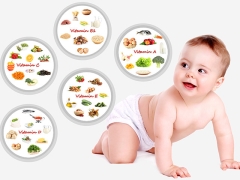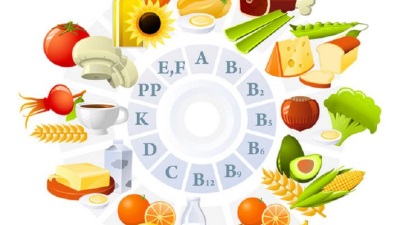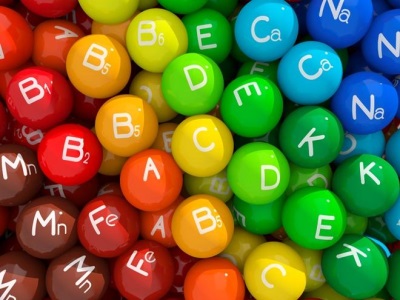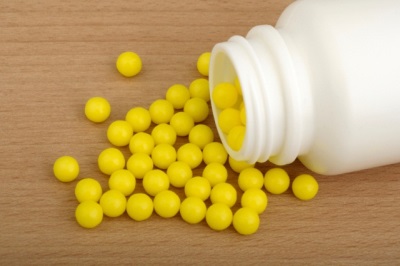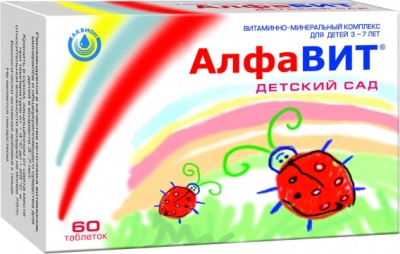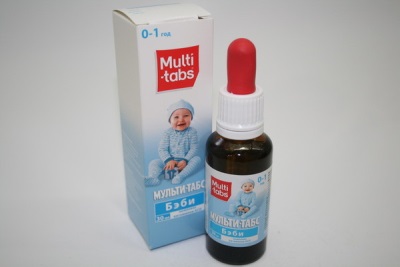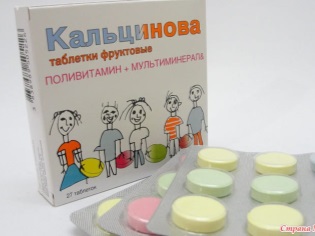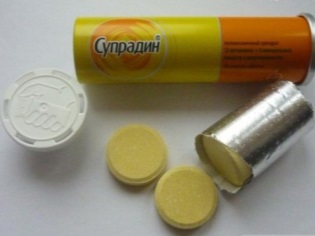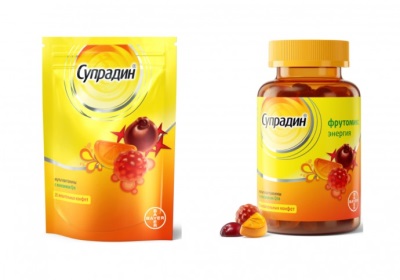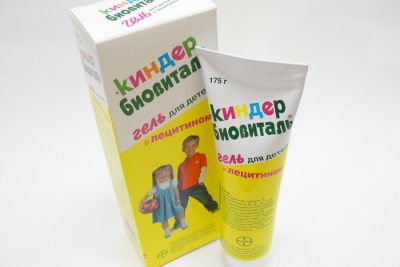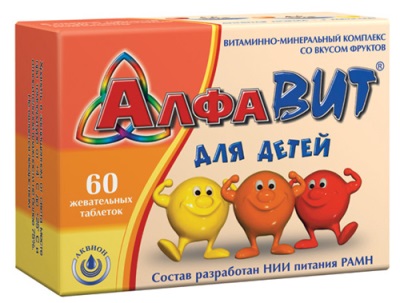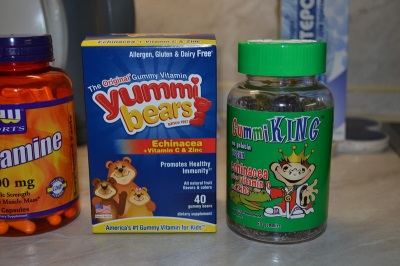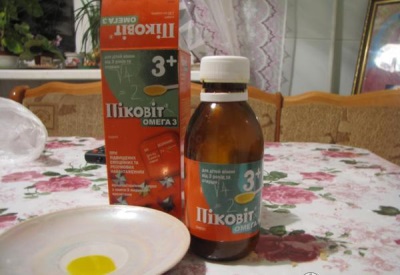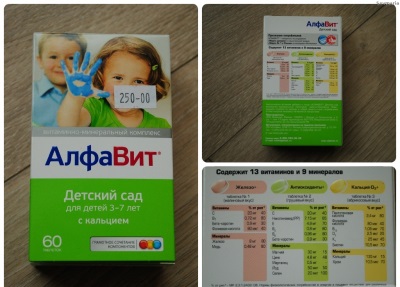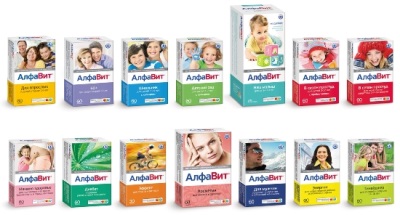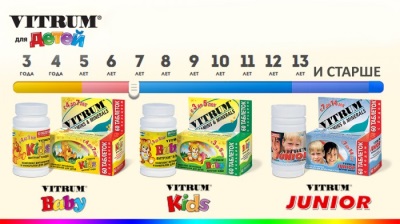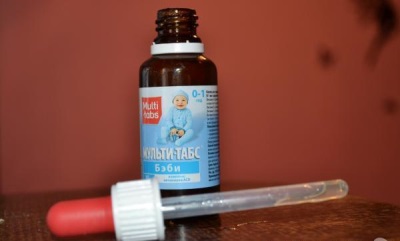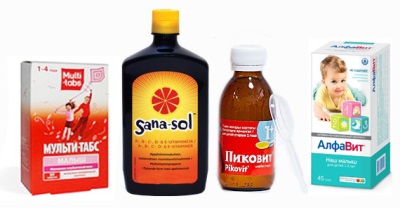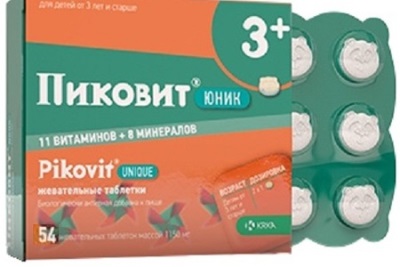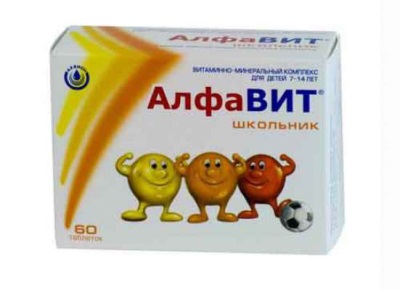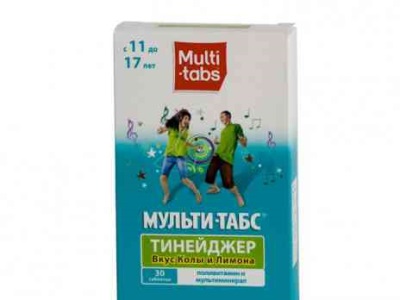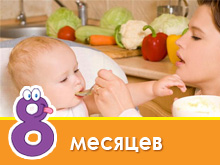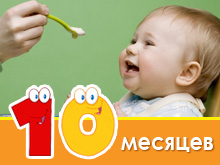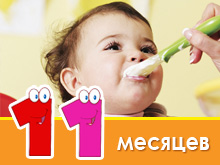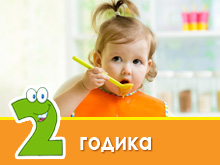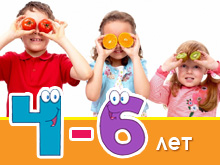The best vitamins for children
There is no point in arguing about the benefits of vitamins for a child’s body, but the question of where their children will come from causes different opinions. Some parents believe that children are best to give complex vitamins. Others believe that the child has enough vitamin substances from food and should pay attention primarily to the infant's diet.
Someone first turns to the doctor and picks up the complex with him, and someone is guided by the reviews and advice of friends, buying a multivitamin of a famous brand. Whose tactics are correct, do you need vitamin supplements for your child, what are they and how to choose the best complex? Let's figure it out.
What vitamins do children need?
For the full development of the child should receive daily vitamins, which are divided into fat and water soluble. Fat-soluble carry vitamins E, A, K and D. They are able to accumulate in the body, so their deficiency is less common. Water soluble are all others. Since they do not accumulate, they should regularly come in either with food or as part of additives.
Effect on the body
The name of the vitamin | Act |
BUT | Control of tissue growth, cell division and regeneration processes, in particular, healing of skin lesions. Participation in photochemical processes of vision (important for twilight vision). Strengthening the immune system (the formation of antibodies). |
D | Participation in the exchange of calcium (increase its absorption) and phosphorus. Effect on the condition of bones and teeth. |
E | Antioxidant action (protection of cells from oxygen radicals). Stabilization of cell membranes (prevents the destruction of red blood cells). Participation in tissue respiration, protein synthesis, metabolic processes in muscles and nervous tissue. Prevention of inflammatory diseases. Reduced blood clots. Lowering cholesterol. Effect on hormone production. Support liver and kidney health. |
TO | Participation in blood coagulation processes (prevents bleeding and reduces vascular permeability). Increased bile formation. Participation in cellular respiration and protein metabolism. |
IN 1 | Participation in the metabolism of carbohydrates (important for the release of energy), proteins (inhibits their breakdown) and fats. Impact on the nervous system (restores peripheral nerves and helps to carry out nerve impulses, regulates the brain). Supports immunity, increasing the body's resistance to infections. It improves digestion (stimulates the secretion of gastric juice, improves liver function, supports gastric motility). |
AT 2 | Participation in cellular respiration and oxidative reactions. Regulation of carbohydrate metabolism, as well as the synthesis and assimilation of proteins and fats. Improve digestive function. Regulation of the nervous system. Improving visual acuity. Reducing heart rate and blood pressure, preventing the development of anemia. Strengthening immunity. Antihistamine action. |
PP | Participation in exchange processes. Expansion of vessels. Synthesis of hormones. Improving the work of the stomach, skin condition and muscle work. Regulation of the liver. Stimulation of the formation of red blood cells. |
AT 5 | Participation in exchange processes. Biosynthesis of hormones. Activation of growth processes. Protection of mucous membranes from infection and normalization of the skin condition. Acceleration of hair growth. |
AT 6 | Important for amino acid metabolism. Participation in carbohydrate metabolism. Impact on the nervous system. Strengthening immunity. Help in the fight against diabetes, hypertension and depression. |
AT 12 | Important for blood formation and activation of folic acid. Participation in the metabolism of proteins and nucleic acids. |
WITH | Participation in recovery reactions. Antioxidant action and inactivation of free radicals. Participation in the formation of hemoglobin. Improving the absorption of iron in the intestines. Participation in the formation of corticosteroid hormones. Strengthening the immune defense of the body. |
H | Influence on growth processes and energy metabolism. Support healthy skin, hair and nails. |
AT 9 | Prevention of anemia. Increased appetite. Positive effect on skin condition. |
Is it possible to get all the necessary vitamins from food?
If you pay close attention to the balance and diversity of the child's diet, it is quite possible to provide the child with all the necessary vitamin substances from food. To do this, it is important to know which foods contain vitamins:
The name of the vitamin | Sources |
IN 1 | Cereals, bread, bran, legumes, vegetables, meat |
AT 2 | Eggs, liver, cottage cheese, dairy products, cereals, yeast |
PP | Eggs, oatmeal, liver, nuts, meat, vegetables |
AT 5 | Eggs, liver, cheese, beef, cabbage, nuts, oatmeal |
AT 6 | Meat, liver, fish, cereals, potatoes, nuts |
AT 9 | Soy, vegetables, liver, fish, eggs, cheese, cereals, berries |
AT 12 | Meat, fish, liver, yolk, dairy products |
WITH | Berries, fruits, vegetables, rosehips |
H | Offal, soybeans, nuts, fish, rice, eggs, cabbage |
BUT | Sea fish, yolks, butter, liver, greens, vegetables, milk |
E | Vegetable oils, whole grain bread, spinach, cabbage, seeds, nuts |
D | Meat, fish, eggs, butter, sour cream |
TO | Cabbage, spinach, lettuce, carrots, peppers, tomatoes |
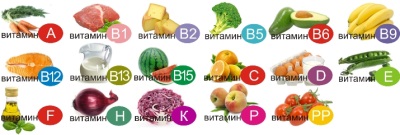
Separately, we note vitamin D, which not only enters the body of children with food, but also is able to be synthesized in the skin cells when sunlight hits them. To prevent its deficiency, it is important to regularly walk with the child on a sunny day.
Signs of shortage
What vitamin is missing | How does the deficit |
WITH | Decreased appetite, fatigue, lethargy, pale skin, bleeding gums, capillary fragility, cyanosis of the nose and lips, frequent ARVI, weakness in the legs. |
BUT | Vision impairment, skin problems, slower physical development, deterioration of hair condition, frequent inflammation of the respiratory system, stomatitis, impaired digestive function. |
IN 1 | Increased fatigue, sleep disturbance, irritability, drowsiness, decreased memory, cold limbs, bluish skin, loss of appetite, abdominal pain, muscle weakness, tachycardia, pain in the heart, paresthesias. |
AT 6 | Decreased appetite, growth retardation, anemia, general weakness, anxiety, skin lesions, conjunctivitis, gastrointestinal disorder, increased excitability. |
D | Sweating, sleep disturbances, increased irritability, muscle hypotonia, delayed closing of the spring and teething, liver enlargement, weakness, frequent diseases of the respiratory tract, cramps, brittle nails, bone deformities. |
E | Development of anemia, muscle weakness, bleeding tendency. |
TO | The appearance of bleeding and hemorrhage. |
AT 2 | Peeling of the skin, dry lips, the appearance of jade, glossitis and stomatitis, visual impairment, insomnia, growth disorders. |
PP | Weakness, dizziness, insomnia, roughness and peeling of the skin, pale and dry lips, swelling of the tongue, muscle pain, drooling, lethargy, rashes on the skin. |
AT 5 | Flaccidity of the muscles, dermatitis, indigestion, tingling in the limbs, hair loss. |
AT 9 | The appearance of anemia, diarrhea or constipation, growth disorders, mental retardation. |
H | Dry and pale skin, peeling skin, hair loss, drowsiness, developmental delay, anxiety, apathy, loss of appetite. |
AT 12 | Increased fatigue, decreased appetite, diarrhea, irritability, hair loss, anemia, low-grade fever, impaired functioning of the nervous system. |
What can cause vitamin deficiency in children can be found by watching the next video.
Does the child need supplements?
Not every child needs vitamin complexes, and it is best if the need for such supplements is agreed with the doctor, because the main reason for giving the child vitamins is the detection of hypovitaminosis. When the doctor detects his signs, he will recommend a drug that contains the necessary vitamin and specify its dosage.
There are different opinions about the need to give multivitamins to children. Some doctors believe that prophylactic intake is not needed and such drugs are not shown in childhood. Other experts believe that in some cases it is justified.
For example, in the first year of life, vitamin D is prescribed to prevent the development of rickets, especially during the cold season or when living in the northern region. There are other indications for taking vitamin supplements, so Definitely deny their need for children can not.
So, Dr. Komarovsky believes that in the case of a balanced diet and the absence of symptoms of beriberi, vitamin complexes are not needed for the child. And the Union of Pediatricians of Russia, on the contrary, instructs on their use even as a preventive measure. See the next video for more details.
Kinds
All supplements with vitamins for children can be divided into:
- Single component. Such preparations contain one vitamin, for example, ascorbic acid.
- Multicomponent. Such supplements include several vitamins at once, and can also be supplemented with mineral salts, fruit extracts, healthy fats and other ingredients.
Forms
Vitamin preparations for children are in this form:
- Liquid. They are represented by solutions that are dosed in drops. They are often intended for children of the first years of life. Also for an early age, multivitamins can be a sweet syrup.
- In tablets. Chewable tablets are most popular for children 3 years and older. Also in childhood, effervescent tablets are used, which are dissolved in water to obtain a vitamin drink.
- In the form of lozenges. Such complexes, which are marmalades with an interesting shape (bear, fish, asterisks or other), are also very popular among children, as they resemble candy.
- Gel. Such vitamins are sold in tubes, inside which is a delicious gel.
Indications
Children can prescribe vitamins for:
- Insufficient or poor quality nutrition, for example, with vegetarianism or medical diet.
- Reducing the amount of vitamins in food, for example, in winter and spring.
- Intensive growth, which is observed in preschool and adolescence.
- Stay in extreme climatic conditions.
- Increased need for vitamins associated with high physical exertion.
- Diseases of the digestive tract, in which the absorption of vitamins worsens.
- Violations of the intestinal microflora composition, in which the synthesis of vitamins is impaired (including the use of antibiotics).
- The recovery period after surgery or an infectious disease.
Contraindications
Complex vitamins do not give when:
- Intolerance to any component.
- Hypervitaminosis.
- Severe kidney disease.
- Disorders of the metabolism of minerals, such as calcium.
Side effects
When taking multivitamin supplements can be:
- An allergic reaction, such as a skin rash, angioedema, hives other.
- Change urine color.
- Decreased appetite, nausea, diarrhea, constipation, or other digestive disorders.
Overdose
For most water-soluble vitamins, the dose that can cause a toxic effect is very high, so the cases of overdose are almost never encountered. However, taking fat-soluble vitamin compounds should be cautious, in particular, with the consumption of vitamins D and A. Exceeding their permissible dose 10 times or more is dangerous to the health of the child, as well as prolonged slight excess dosages, as they accumulate in the body.
Hypervitaminosis A is manifested:
- Drowsiness.
- Vomiting.
- Skin rashes.
- Fever.
- Increased intracranial pressure.
- Peeling and skin pigmentation.
- Bone pains.
- Brittle hair and nails.
- Weight loss.
- Insomniac

Hypervitaminosis D is dangerous intoxication, deterioration of the heart and nervous system. If the dosage of such vitamin is exceeded for a long time, the child's sleep worsens, weakness and irritability appear, the spring is prematurely closed.
Another vitamin, overdose which adversely affects the health of the child, is ascorbic acid. Prolonged its use in high doses can provoke insomnia and headaches, restless behavior, changes in blood clotting. In addition, high dosages of ascorbic acid promote the excretion of vitamins from group B.
A significant excess of the dosage of vitamins B5 and PP threatens with the appearance of vomiting and erosive gastritis. In case of an overdose of vitamin B12, tachycardia occurs, nervous irritability increases and blood clotting is disturbed.
Vitamin Complex Supplements
With calcium
This mineral is involved in the formation of bones, it is important for strengthening the teeth, skeletal growth and muscle contractions. Calcium supplements often include vitamin D and phosphorus, because they improve its absorption and maintain activity. Examples of such complexes are Multi-tabs Baby Calcium +, Vitamishki Calcium + and Calcium D3 Complivite.
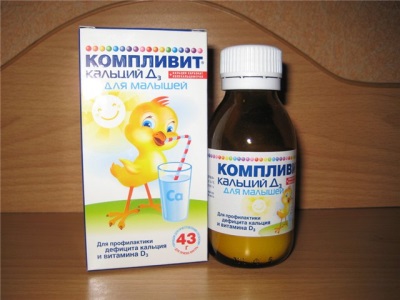
With magnesium
This element is involved in many processes, including energy production, transmission of nerve impulses, regulation of the state of blood vessels and protein synthesis. It is important for reducing nervous excitability and protecting the body from inflammation and infection. A child can get magnesium from Vitrum, Alphabet, Jungle Kids, Complivit Asset and others.
With Echinacea
In the extract of this plant, properties are noted to strengthen the immune system and accelerate recovery from viral infections. It can be found in the composition of the children's vitamins Gummy King (from 2 years), Natural Dynamix (from 4 years) and Vitamin Friends (from 2 years).
With fish oil
This ingredient of children's vitamins is important for brain function, growth processes and cardiovascular health. It is found in complex supplements Pikovit Omega 3, Supradin Kids, Univit Kids and others.
With selenium
This trace element is important for the formation of enzymes and hormones in the children's body. It participates in metabolic processes, improves skin condition, supports the cardiovascular system and protects the child from nervous tension. Such an element is present in the complexes Multi-Tabs, VitaMishki Immuno +, Alphabet Kindergarten, Complivit Aktiv, Vitrum Baby, Jungle Kids, Vitrum Kids and others.
Supplements with selenium will help strengthen the immune defense and have a fortifying effect.
With choline
This substance, also called vitamin B4, is important for the condition of the liver and the functioning of the nervous system. Its presence in vitamin supplements has a positive effect on the attention and memory of the child. Among choline additives, Univit Kids, Supradin Kids, VitaMishki Bio + and Supradin Kids Junior are popular.
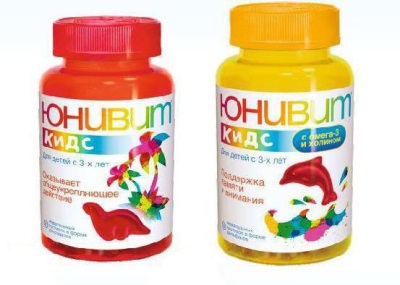
Review and rating of the best
The most popular and well-proven vitamin supplements for children are:
- Vitamins Alphabet. A feature of the complexes of this manufacturer is the combination of individual vitamins and mineral salts in 3 daily doses. In each dose, all substances contribute to the absorption of each other, and at the same time do not interfere with the assimilation of the ingredients of other doses. This makes Alphabet vitamins less allergenic and more effective.
For children 1.5-3 years old, the manufacturer offers vitamins in powder form (in individual sachets), and for children from 3 years old - chewable tablets. In such multivitamins there are no synthetic colors, preservatives or flavors.
- Complexes Vitrum. The main advantage of additives of this brand is their rich composition. Each Vitrum complex includes all the vitamin compounds important for the growth of children and valuable minerals. Among them, there are “growth trios”, which include magnesium, phosphorus and calcium. The Vitrum range of children's vitamins is represented by chewable tablets and lozenges for children of different ages, from 3 years old and ending with teenagers.
- Vitamins Pikovit. Supplements of this brand are presented in different forms - for children over the year, the manufacturer offers syrup, including basic vitamins, chewable tablets are produced for children over 3 years old, and coated tablets are intended for children over 7 years old. Sugar-free supplements are present in the Pikovit assortment, which makes it possible to take them with diabetes, overweight or caries.

- Complexes Multi-tabs. One of the advantages of children's multivitamins of this brand is the absence of chemical additives (dyes, flavors, preservatives). In addition to the complex, the Baby Multi-Tabs includes a calcium-fortified complex (Baby Calcium +) and an additive with probiotics (Immuno Kids).
- VitaMishki. Such multivitamins in lozenges are shaped like cubs than children like. The advantages of Vitamishek are also natural fruit and vegetable extracts, the absence of artificial colors and pleasant tastes.The range of such vitamins allows you to choose an additive based on the needs of the child.
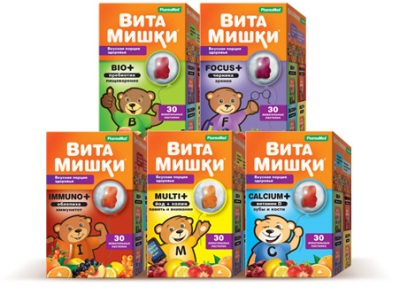
Multi + is recommended for supplementing the children's diet with the Multi + complex, Immuno + is used to strengthen the body's defenses, and Calcium + lozenges are recommended for strengthening bones and teeth. If the child needs to adjust the digestion, they are given Bio + cubs, and the Focus + complex should be used to support the eyes.
Tips for choosing
It is best of all to select multivitamins for the child with the doctor, having discussed indications to their appointment. In the selection of the complex, you should take into account its composition:
- For hyperactive children and under stress A complex should be selected that contains the B vitamins, as they are important for the nervous system.
- If you have problems with appetite pay attention to the presence in the complex of vitamins A, C and group B.
- For sports kids Vitamins D, B1, A, PP, B9, E and C are most important.
- Complexes with probiotics / prebiotics shown to children who have problems with the digestive system.
- To work the brain, improve attention and memory the child recommends complexes with ascorbic acid, B vitamins, iodine, copper, zinc, calcium, vitamins D, A, and E.
- For skin in the selected complex should be vitamins B6, H, A, PP and C.
- Often sick kids Recommended complexes in which there are vitamins E and C, zinc, selenium and iodine.
Age selection
The age of the child is one of the main selection criteria, since at each age the requirements for vitamin compounds are different.
Up to a year
Children under the year multivitamin complexes in most cases are not required. Babies get all the necessary substances from the mother's milk, and children-artificials - from the mixture, which is enriched with the necessary for the development of the crumbs of minerals and vitamins. If the child is under one year old and needs vitamins, the doctor should prescribe them.
Most often, babies require vitamin D, especially in the winter or in the northern region. Complexes for infants often contain only a few vitamins, for example, in the Multi-tabs Baby Baby supplement there are only vitamins D, C and A, and the Complite Calcium D3 complex for babies contains only calcium and cholecalciferol.
From year to 3 years
At this age, the child's body grows rapidly (especially its bone system) and all milk teeth erupt; therefore, children of 1-3 years most need calcium, magnesium, vitamins C, D, A and E, iron, phosphorus, folic acid and zinc . A child can receive all these substances both from food (if the diet is balanced) and from such additives as Pikovit syrup 1+, Sasha Multi-tabs Our baby, Sana-Sol syrup, Kinder biovital gel and others.
From 3 to 6 years
Active growth continues at this age, so a sufficient intake of vitamins for a child of 3-6 years is very important. In addition, at this age, the child often begins to attend pre-school institutions, which necessitates strengthening his immune defense. The most important vitamins for a 3-6 year old child are C, D, E and A.
It is also important to consume enough vitamins of group B, calcium, iodine and zinc. The preschooler can receive these compounds from the complexes Pikovit 3+, Alphabet Kindergarten, VitaMishki, Multi-Tabs Malysh and others.
At school age
High mental stress, changing teeth, visiting sports sections, communication with peers - these and other factors make vitamins and minerals for schoolchildren vital. This is especially true for vitamins B and A, ascorbic acid, iodine, selenium, calcium and iron.
In order to supplement the diet with the purpose of their sufficient income for this age, Alphabet Shkolnik, Vitrum Junior, Multi-Tabs Junior and others have been developed.
In adolescence
Changes in metabolic processes and hormonal levels in the body of 12-18-year-old children require an increased intake of mineral compounds and vitamins. In particular, it is especially important for teenagers to get vitamins A, D, E, C and group B, and zinc, phosphorus, iron, calcium, magnesium and iodine are considered key minerals in adolescence. Their sources for a child of this age can be the Pikovit Forte, Multi-tabs Teenager, Alphabet Teenager complexes and others.
Terms of Use
- Vitamin supplements are prescribed courses, the duration of which is better to coordinate with the pediatrician. Most often, multivitamins take 1-2 months.
- It is important to strictly observe the dosages recommended by the manufacturer in the instructions. Giving them to a child at a higher dose is unacceptable.
- It is also important to consider the age limit for specific vitamins. For example, if the complex is indicated for children over 3 years old, it is impossible to give it to a child a year or at the age of two. It is also contraindicated to give the child complex vitamins, which are intended for adults.
- Often they are given in the morning during breakfast or immediately after it.
- When a child takes a multivitamin complex, in order to avoid stress on the kidneys, you should give him more drink.
Reviews
Parents respond differently. In most cases, multivitamin complexes of well-known manufacturers receive good reviews. Moms emphasize their effectiveness, pleasant taste, convenient form of release, but often complain about the imbalance of the composition (lack of certain vitamins or minerals), as well as the high cost. Children tolerate vitamin supplements for children mostly well, although there are cases of allergic reactions.
If you want to read the real reviews of children's vitamins, we offer to view the following video.
Opinion Komarovsky
The popular doctor does not deny the importance of vitamins for the children's body, but is in favor of the opinion that the child should receive them mainly from food. Vitamin complexes Komarovsky calls curative and prophylactic agents, focusing on the fact that they should be prescribed in case of revealed hypovitaminosis or for the prevention of vitamin deficiency in a particular child.
Giving a child a multivitamin supplement for prophylactic purposes without a testimony known pediatrician does not recommend. According to him, it is better to pay attention to the diet of the child, and not to enrich the producers of vitamins.
For more on this, see the transfer of Dr. Komarovsky.
A little bit about antivitamins
There are substances that can reduce the activity of vitamins, called for such action antivitamins. The most famous representative of such substances is avidin, a protein present in raw eggs. It binds vitamin H and reduces its activity, but during heat treatment avidin loses its properties.

If you eat raw fish, it threatens thiamine deficiency due to the presence of thiaminase in the fish. When you receive sulfonamides may interfere with the synthesis of vitamin B9 in the intestine.
Similar antagonists are available for each vitamin.
On the choice of vitamin complexes, see the following video.
